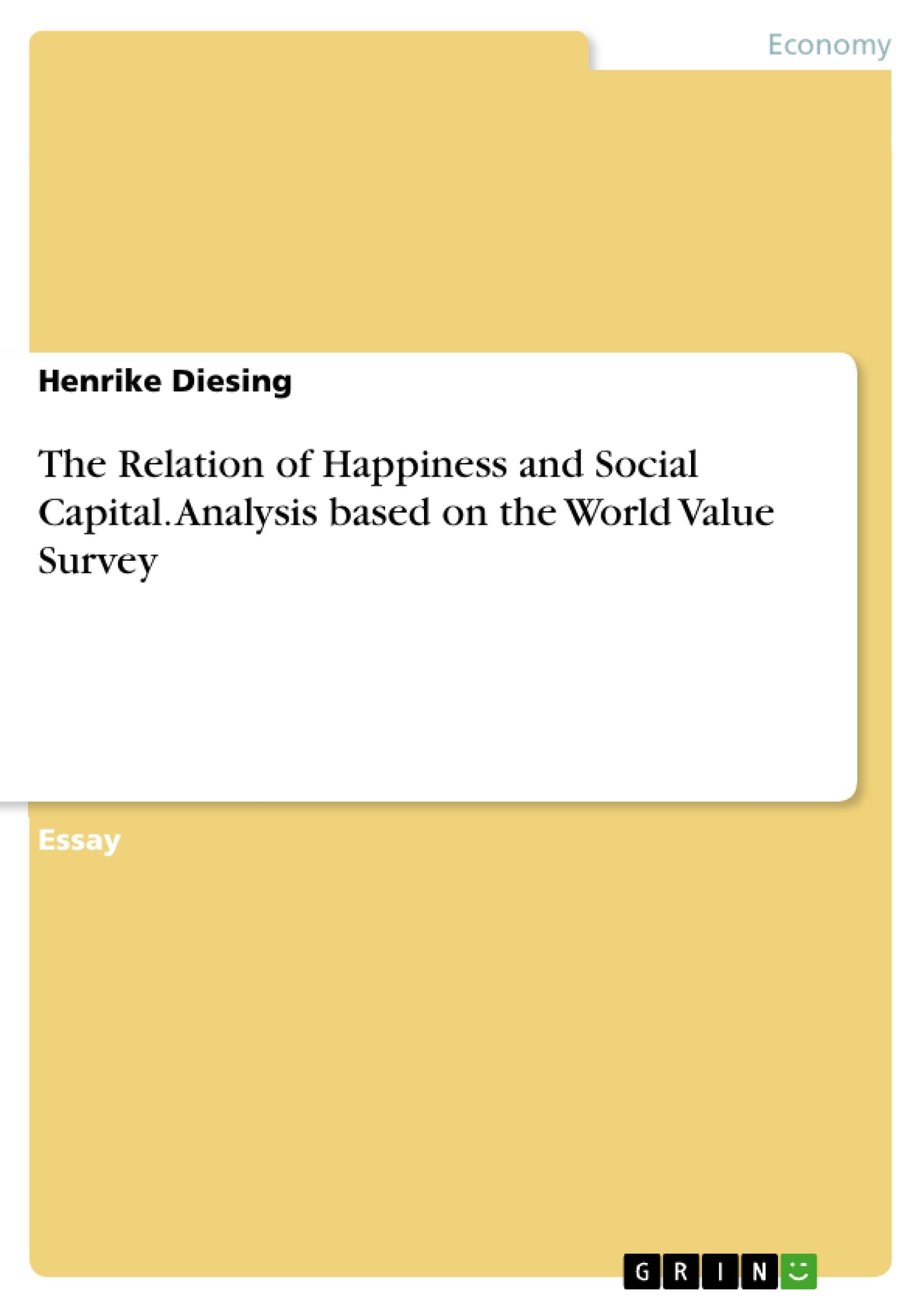This paper has been written as an essay for an undergraduate course and is six pagers long.
This essay will examine the relation between social capital and happiness. So far, much research has been conducted in the field of social capital in order to test and define its far reaching influence. Social capital has not only received tremendous attention from the social scientists, but also from economists. Research has focused on the implications of social capital and the political system and has examined the relation of social capital and growth. So far, however, little research has been conducted to link social capital and happiness. Both aspects are intrinsic to human action and are essential for understanding human development and behavior. Hence, the research question of this paper is: Is there a relation between social capital and happiness? If yes, what are possible policy implications?
To answer the posed research question this paper will first give a short literature review of the terms social capital and happiness and formulate a research hypothesis. Second, this paper will identify and analyze data from the fifth wave of the World Value Survey to assess the relation between social capital and happiness. Finally, the findings will be summarized and policy implications developed.
This paper has been written as an essay for an undergraduate course and is six pagers long.
Inhaltsverzeichnis (Table of Contents)
- Introduction
- Literature Review
- Social Capital
- Happiness
- Testing
Zielsetzung und Themenschwerpunkte (Objectives and Key Themes)
This paper examines the relationship between social capital and happiness, investigating whether a connection exists and exploring potential policy implications. The research utilizes data from the World Value Survey to assess this relationship on a country level.
- The definition and application of social capital in different fields.
- The concept of happiness and its influence on individual decisions and actions.
- The relationship between social capital and happiness, particularly focusing on trust and civic engagement.
- The impact of social capital on individual well-being and societal development.
- Potential policy implications for fostering social capital and enhancing happiness.
Zusammenfassung der Kapitel (Chapter Summaries)
The introduction outlines the research question, which investigates the relationship between social capital and happiness. It also sets out the structure of the paper, including a literature review, data analysis, and discussion of findings and policy implications.
The literature review section delves into the theoretical concepts of social capital and happiness. It explores various definitions and applications of social capital, highlighting the contributions of researchers like Pierre Bourdieu, James Coleman, and Robert Putnam. The section also discusses the growing recognition of happiness as a significant factor in human behavior and decision-making.
The testing section details the methodology used to analyze the relationship between social capital and happiness. It describes the data source (World Value Survey), the sample selection criteria, and the operationalization of key concepts. The section also presents preliminary findings based on the analysis of happiness and social capital scores across different countries.
Schlüsselwörter (Keywords)
The key concepts and topics explored in this paper include social capital, happiness, trust, civic engagement, World Value Survey, policy implications, subjective well-being, and human development.
Frequently Asked Questions
Is there a link between social capital and happiness?
The study explores this connection using World Value Survey data, suggesting that trust and civic engagement (key components of social capital) correlate with higher levels of happiness.
What data source is used for this analysis?
The paper utilizes data from the fifth wave of the World Value Survey to assess social capital and subjective well-being on a country level.
Who are the key theorists of social capital mentioned?
The literature review highlights the works of Pierre Bourdieu, James Coleman, and Robert Putnam.
What are the policy implications of this research?
If a strong relation exists, policies should focus on fostering social trust and community involvement to enhance the overall well-being of the population.
Why is social capital important for human development?
Social capital facilitates cooperation, reduces transaction costs in societies, and provides individuals with emotional and practical support networks.
- Quote paper
- Henrike Diesing (Author), 2013, The Relation of Happiness and Social Capital. Analysis based on the World Value Survey, Munich, GRIN Verlag, https://www.grin.com/document/338873



